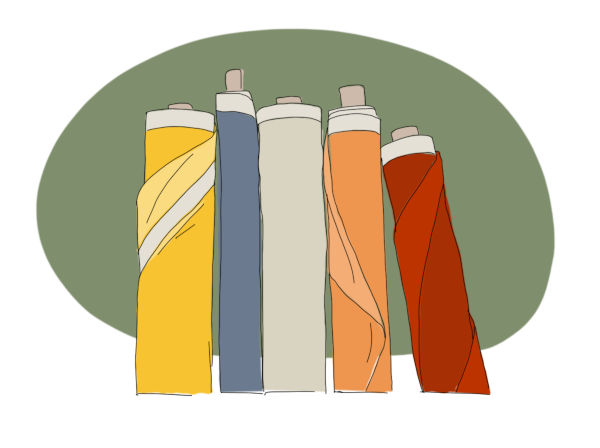Fast Fashion – Let's Talk about the clothes we wear
What is Fast Fashion?
Fast fashion is a design, manufacturing, and marketing method focused on quickly producing high volumes of clothing. Fast fashion replicates trends using low-quality materials (like synthetic fabrics). You probably own fast fashion.
These cheaply made, trendy pieces resulted in an industry-wide movement towards overwhelming amounts of consumption. Unfortunately, this results in harmful environmental impacts on the environment, garment workers, and consumer wallets.
Facts
- Second most polluting industry
- Sustainability - only 20% of brands walk the talk.
- Unworn clothes in UK wardrobes: £30 billion
- 150,000 double decker busses of UK clothing & textiles go to landfill each year
Wasn't it always like this?
Up until the mid-twentieth century, the fashion industry ran on four seasons a year: fall, winter, spring, and summer. Designers would work many months ahead to plan for each season and predict the styles they believed customers would want. It wasn’t until the 1960s that a well-timed marketing campaign for paper clothes proved consumers were ready for the fast fashion trend. This resulted in the fashion industry quickening its pace and lowering costs.
Nowadays, fast fashion brands produce about 52 “micro-seasons” a year—or one new “collection” a week.
According to Fast Company, “apparel companies make 53 million tons of clothes into the world annually,” and the amount has surely increased since the article’s original release in 2019. “If the industry keeps up its exponential pace of growth, it is expected to reach 160 million tons by 2050.”
Another issue with fast fashion is how it is made. Most of our clothes are made in countries in which workers’ rights are limited or nonexistent.
Garment workers are often forced to work 14 to 16 hours a day, 7 days a week. During peak season, they may work until 2 or 3 am to meet the fashion brand's deadline.
Buying fast fashion means supporting these conditions. Your shopping behaviour can really make a difference!
Another issue to consider is the fabric clothes are made of

Polyester is in most of our clothes and it is toxic.
Polyester is a plastic. It's a petroleum-based product, non-biodegradable and highly toxic to our planet and humans. The manufacturing process requires over 70 billion barrels of oil each year and uses twice the amount of energy to produce as cotton. Harmful chemicals (many of them cancer-causing carcinogens) are used during all stages of polyester production.
Natural and low-impact dyes do not work on polyester fibres, so harmful chemical dyes are used and later disposed of in our waterways.
Polyester fabric releases chemicals which cause hormone disruptions and health issues through skin contact.
Washing polyester is the biggest source of microplastic pollution in our oceans and water systems.
An average of 1,900 tiny plastic fibres are shed with each wash, eventually landing in our oceans.
The problem? We ingest the micro plastics, through our drinking water and foods.
Did you know? Within our lifespan we consume as much as two large bin caddys worth of plastic...
What does this mean for us? Scientists are not sure what plastic ingestion means for us, we know that nanoparticles can be taken up by our muscle tissues but the wider effects are yet to be explored.
How can you make a difference?
If you do choose to buy new, shop from sustainable and ethical fashion brands. This way you ensure your clothing choices are not harming the environment. Not only will this ensure that your carbon footprint is low, but it will also help promote fair working practices for people around the world.
Ask the question 'Do I really need this?'
Buy less often & buy quality
Fast fashion retailers have convinced us that we need the newest styles to be happy. But these styles are usually created from cheap materials that don’t hold up, requiring us to buy more. To fight fast fashion, be picky about what you wear and buy slow fashion instead! This might mean saving up but in return you will get more joy out of your clothes. Check out how 'good' clothing brands are here:
Don't throw away clothes you no longer wear & consider buying second hand
- Give your clothes a second life. From donation centres to car boot sales, there are countless ways to redistribute the clothes you no longer need without harming the environment. Just make sure they are washed and in good condition before you send them on their way!
Rethink the way you wash your clothes
- Wear clothes longer between washings
- Air dry clothes whenever possible
- Avoid using chlorine bleach
- Only wash full loads
- Pay attention to the amount of detergent you use
- Wash clothes at 30°C.
Look for these fabrics instead:
- Sustainable Natural and Vegan Fabrics
- Organic Cotton, Recycled Cotton, Organic Hemp, Organic Linen, Organic Bamboo (Bamboo Linen), Cork
- Sustainable Semi-Synthetic Fabrics (mostly vegan)
- Animal Derived Natural Fabrics (sustainable depending on source)
More Resources
Lifestyle
More resources can be found here
Sustainable Dundee Map
Visit the Sustainable Dundee Map to find out what happens locally
